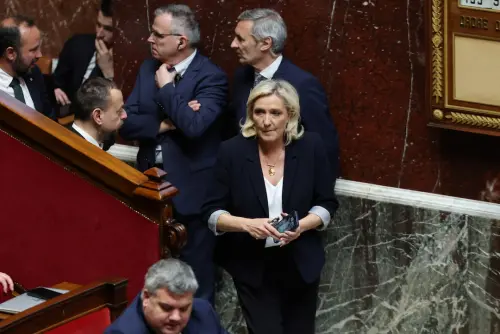When the leader of the French far-right accused the judiciary of deploying a "nuclear bomb" to undermine her presidential aspirations, she added France to the list of countries where claims of "lawfare"—political interference by judges—are becoming prevalent.
A court ruled that she and two dozen members of her National Rally (RN) party had embezzled EU funds. This decision led to an immediate five-year ban on her eligibility to run for office, preventing her from participating in the 2027 presidential election unless she successfully overturns the ruling on appeal before that time.
Le Pen and her supporters, including former Brazilian President Jair Bolsonaro—who is also barred from office until 2030—accused the judiciary of interfering in democracy.
French Prime Minister François Bayrou expressed "unconditional support" for the judiciary during a parliamentary session. While he maintained that the ruling did not undermine democracy, he admitted to having "questions" regarding Le Pen's ban. He suggested that if politicians disagreed with the law allowing such bans, they should work to change it. RN-allied lawmaker Éric Ciotti stated he would pursue that goal.
According to an Elabe opinion poll conducted for BFM TV, nearly 60% of respondents considered the ruling against Le Pen fair in light of her offenses, although 42% viewed it as politically motivated. The poll indicated that approximately 42% of voters supported the verdict, while around a third were dissatisfied and another third had no opinion.
Mathieu Carpentier, a constitutional law expert at Toulouse Capitole University, dismissed the notion that Le Pen was a victim of "judicial warfare." He noted that the evidence against her was substantial and that her punishment was consistent with those imposed on a growing number of individuals facing immediate bans due to strict anti-corruption laws enacted in 2016.
Carpentier emphasized that France's independent justice system and robust appeals process serve as safeguards against unjust rulings. However, he acknowledged that France is no longer immune to political attacks on its judicial system.
"It's clear something is starting to rot in France," he said. "We are beginning to assume that any judges' decision we disagree with is politically motivated."
He pointed to the threats against the prosecutors involved in Le Pen's case and one of the judges as evidence of societal malaise in France. These threats persisted after Judge Bénédicte de Perthuis delivered her ruling, with her image being shared across X and other far-right websites.
"Bénédicte de Perthuis is the ugly leftist witch who banned Le Pen from running for office," one user posted on X, exemplifying the hostile environment.
Le Pen, alongside Justice Minister Gérald Darmanin and the High Council for the Judiciary, condemned these threats. Paris police confirmed an investigation was underway, directing inquiries to the Paris prosecutor's office, which did not respond.
Others labeled the ruling against Le Pen as "pure lawfare," claiming that this movement of judicial activism is spreading globally. U.S. President Donald Trump drew parallels between Le Pen's situation and his own legal challenges, stating, "She was banned for running for five years, and she's the leading candidate. That sounds very much like this country."
Although Trump has faced legal issues related to falsifying documents in connection with a payment to silence a porn star ahead of the 2016 election, he has characterized these cases as part of a leftist witch-hunt.
Vice President JD Vance and Trump's ally Elon Musk have raised similar accusations of lawfare against other European nations, including a ruling by Romania's top court that barred a candidate from running for president.
"You cannot win a democratic mandate by censoring your opponents or putting them in jail," one speaker stated during a February address at the Munich Security Conference. "Shutting down elections or excluding people from the political process protects nothing. In fact, it is the most surefire way to destroy democracy."
While Le Pen protested against her sentence, she has vowed to pursue legal avenues to restore her candidacy for 2027, reaffirming her commitment to the rules of France's Fifth Republic. Her protégé, 29-year-old party president Jordan Bardella, who is now the RN's de facto candidate for the 2027 election, urged the public to support Le Pen with "democratic, peaceful, calm mobilizations."
